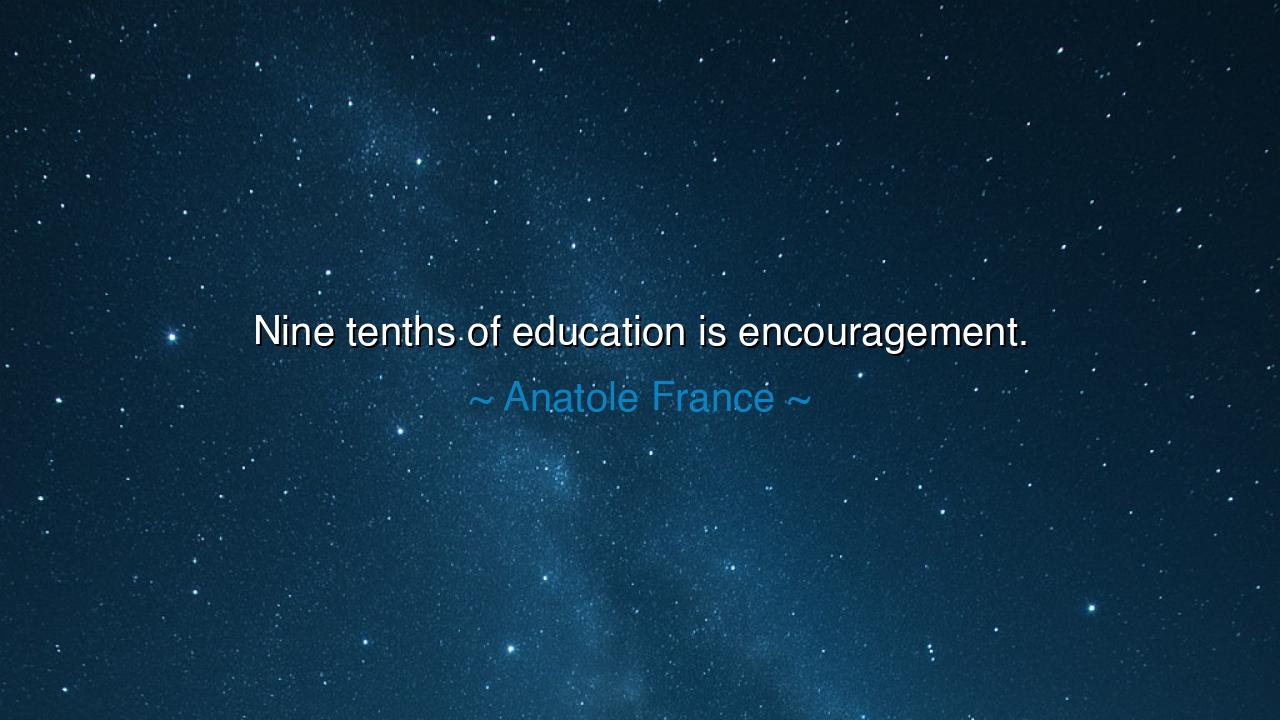
Nine tenths of education is encouragement.






"Nine tenths of education is encouragement." Thus spoke Anatole France, the French novelist and philosopher whose pen carved truths into the heart of human nature. In this brief and shining sentence, he distills the essence of all true teaching—that knowledge alone cannot awaken the soul, but encouragement can. For facts fill the mind, but only faith in one’s ability gives those facts life. To educate, said France, is not merely to instruct, but to inspire—to lift the spirit of the learner so that it may believe in its own power to rise.
Anatole France lived in an age of intellectual revolution, where science, literature, and philosophy wrestled for the spirit of man. In such a time, education often became mechanical—a transaction of information rather than a transformation of character. But France, with his deep compassion for the human soul, reminded the world that education must first touch the heart before it can enlighten the mind. His words were a protest against cold instruction. He believed that beneath every student’s hesitation lies potential waiting for warmth—the warmth of a teacher’s belief. Encouragement, he taught, is the light that draws forth the hidden seeds of greatness.
Consider this truth in the story of Thomas Edison, one of history’s most creative minds. As a boy, Edison was sent home from school after being called “addled”—too slow, too distracted, too incapable of learning. But his mother, with unwavering faith, refused to accept that judgment. She taught him herself, not with scolding or pressure, but with encouragement—telling him he was brilliant, capable, destined to do great things. That belief became the foundation of his genius. Her encouragement did what education alone could not—it educated his courage. And through that courage, he illuminated the world.
The ancients, too, understood this principle. Aristotle taught that the soul of the student must be “aroused to noble action,” not simply trained in logic. Confucius said, “To educate without love is to forge without fire.” Socrates, the wisest of them all, never lectured; he drew wisdom out of others through questions and faith in their potential. Each of these masters understood what Anatole France later voiced so plainly: that encouragement is not a mere comfort—it is the essence of education itself. It is the breath that animates knowledge, the spark that turns information into wisdom.
Encouragement transforms fear into effort. A student who feels trusted will attempt the impossible; one who feels scorned will retreat even from the simple. To encourage is to say, “I see your strength, even when you do not.” It is to call forth the hero sleeping within another. Every teacher, every parent, every leader holds this power—to build or to break, to ignite or to extinguish. And often, a single word of faith can alter a life more profoundly than a thousand lessons. Anatole France understood that the greatest educators are not those who teach the most, but those who believe the most in their students.
This truth extends beyond classrooms. In every human endeavor—art, science, faith, leadership—progress begins with encouragement. Great civilizations rise when their people are told, “You can.” Great inventions are born when a mind, once doubtful, hears, “Try again.” Even nations heal through the encouragement of visionaries who dare to remind them of their strength. To educate, therefore, is not to command obedience, but to awaken confidence—to teach men and women to believe in the light within themselves.
Let this be the lesson passed to all generations: encouragement is the soul of education. If you would teach, first lift the heart; if you would lead, first believe in those you lead. Give your words the power to strengthen, not to wound; your presence the warmth to awaken, not to judge. For as Anatole France so wisely declared, education is not built upon facts but upon faith—faith in the human spirit’s ability to grow. To encourage another is to take part in the oldest and noblest art known to man: the shaping of the soul.






AAdministratorAdministrator
Welcome, honored guests. Please leave a comment, we will respond soon